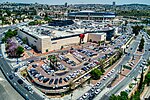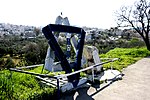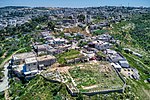Teddy Stadium
1991 establishments in IsraelBeitar Jerusalem F.C.EngvarB from April 2023EngvarB from June 2023EngvarB from November 2023 ... and 4 more
Football venues in IsraelHapoel Jerusalem F.C.Sports venues completed in 1991Sports venues in Jerusalem

Teddy Stadium (Hebrew: אצטדיון טדי) is a sports stadium in Jerusalem. Two major Israeli football clubs currently use it as their home ground: Beitar Jerusalem and Hapoel Jerusalem. The Israel national football team also uses it for select home matches. The stadium is named after long-time Mayor of Jerusalem, Teddy Kollek, who was in office during the time of its initial construction and was one of its prominent advocates.
Excerpt from the Wikipedia article Teddy Stadium (License: CC BY-SA 3.0, Authors, Images).Teddy Stadium
David Ayalon, Jerusalem Malha
Geographical coordinates (GPS) Address External links Nearby Places Show on map
Geographical coordinates (GPS)
| Latitude | Longitude |
|---|---|
| N 31.751166666667 ° | E 35.190616666667 ° |
Address
אצטדיון טדי
David Ayalon
9695102 Jerusalem, Malha
Jerusalem District, Israel
Open on Google Maps











